VikingsGuy
Well-known member
If you are used to flushing labs, they also breed pointing labs. All the good of a lab plus the point.
Follow along with the video below to see how to install our site as a web app on your home screen.
Note: This feature may not be available in some browsers.
What's the good part of the lab? I've never seen more than whining and excessive licking. I'd rather not have a dog than a lab, and I love dogs.All the good of a lab plus the point.
With the exception of pit bulls, all dogs are GREAT! To your question, labs in general are great family dogs and very good hunting dogs. Great with kids, affectionate, fun loving, loyal; and as adults, calm. They are great retrievers and can have great noses. They are hardy in cold weather, and will happily retrieve out of water. (When my buddy brings his Britannies, they just stand and watch my lab retrieve out of anything resembling a wet area - when not with me, my buddy won't hunt areas were a wet retrieve is a possibility as he loses birds). Labs are the single most "owned/popular" breed in the US. Their one downside in my opinion is that they have a long puppyhood - but if you go English style lab they are calm from day 1. Labs are traditionally flushers, but there are a number of good pointing lab breeders out there and a fair number of English style labs have a natural point. One more consideration, they do tend to run hot so location/season temps is something to consider - but up in MN & the Dakotas most hunting is done in cool/cold weather.What's the good part of the lab? I've never seen more than whining and excessive licking. I'd rather not have a dog than a lab, and I love dogs.
My post was a joke, but not really. Most of my friends have labs for hunting, including two that have english labs. And I can assure than nothing you just said is consistently true. I have spent hours with several labs that were as neurotic at age 12 as they were at 12 weeks. I have never been around one that didn't try to lick you to death. I have been around ones that froze if it was under 50 degs.With the exception of pit bulls, all dogs are GREAT! To your question, labs in general are great family dogs and very good hunting dogs. Great with kids, affectionate, fun loving, loyal; and as adults, calm. They are great retrievers and can have great noses. They are hardy in cold weather, and will happily retrieve out of water. (When my buddy brings his Britannies, they just stand and watch my lab retrieve out of anything resembling a wet area - when not with me, my buddy won't hunt areas were a wet retrieve is a possibility as he loses birds). Labs are the single most "owned/popular" breed in the US. Their one downside in my opinion is that they have a long puppyhood - but if you go English style lab they are calm from day 1. Labs are traditionally flushers, but there are a number of good pointing lab breeders out there and a fair number of English style labs have a natural point. One more consideration, they do tend to run hot so location/season temps is something to consider - but up in MN & the Dakotas most hunting is done in cool/cold weather.
Lot's of great dogs out there, and to each there own, but can't go wrong with a good lab.
And that proves you are either joking or crazy.I would MUCH prefer to have a pit than a lab.
That dog looks so very much like my Hank! Except you are better and putting more birds in front of her!Full disclosure.....
My other girl came with a fancy piece of paperwork, was $$$, holds a "hoity toity prize title", and has these prestigious bloodlines......
Do love labs................
 Untitled by Tyler Staggs, on Flickr
Untitled by Tyler Staggs, on Flickr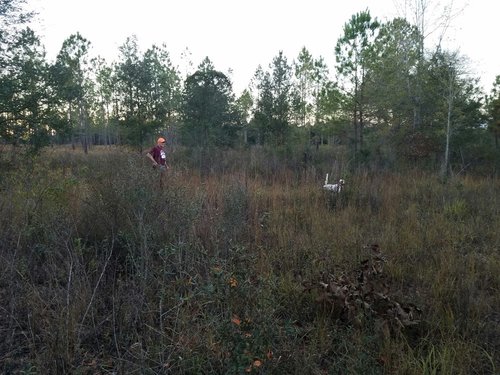
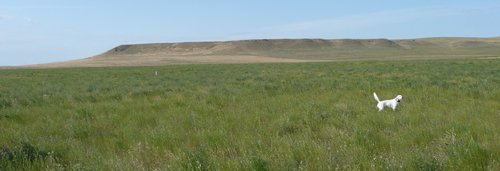
I meant is that I've been around a bunch of high priced labs and a bunch of shelter pits. I'd take the pits any day.And that proves you are either joking or crazy.
And shelters aren't a great place to judge animals. Very few well trained, well treated, well bred dogs in a shelter. Not to say there aren't some great mutts out there too. Dogs are just GREAT (except pit bulls - we should exterminate the breed)
That dog looks so very much like my Hank! Except you are better and putting more birds in front of her!
Untitled by Tyler Staggs, on Flickr
To each their own - but this does explain a few thingsI meant is that I've been around a bunch of high priced labs and a bunch of shelter pits. I'd take the pits any day.
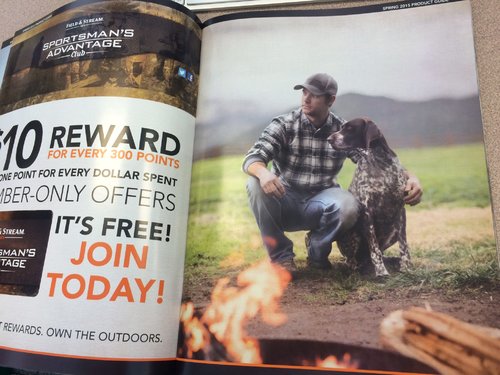
Really a great summary!Lots of good input on this one. I have a DK and a weim. I have been into bird dogs for 10 years. Guys are absolutely right to recommend researching specific lines within the breed once you have narrowed down your search. There is a ton of variation within the breed. I wanted a short haired dog that would do it all and looked extensively before settling on my girls. The differences I noted are:
1. Range-Usually EPs have greater range and work faster. Not an absolute truth, but on average. So how do you want to hunt your dog? On foot or horseback? What type of cover and how much ground do you need to cover to find game.
2. Retrieving- Your average GSP is a better retriever than your average EP.
3. Waterwork- GSPs are usually better waterdogs than EPs. I have seen multiple GSPs place in open retriever trails against all breeds, but never an EP.
4. Fur- Continental bird dogs were not really bred to be "bird" dogs. They were more of an anything that moves type of dog. In general GSPs are "trashier" than EPs. Mine are just as happy to point rabbits, raccoons, foxes, etc... I don't see it as an issue. If they point something I don't want, I call them off and recast them to start hunting again.
These characterizations are born out in the North American Versatile Hunting Dog Association hunt test. They evaluate pointing/field search, waterwork, tracking and retrieving. GSPs dominate the versatile champion registry. Though eligible to run, you rarely see an EP listed. But Open horseback AKC trials that only evaluate seach and pointing are dominated by EPs.
I settled on a weim first then a DK (GSPs parent breed), because I wanted dogs that would hunt everything I wanted. I have used them for doves, waterfowl, upland, and blood tracking big game. They are also excellent family members, but I will say I am pretty hardcore on my obedience training. Any bird dog with high prey drive will be a demon as a pet unless you have the basics of obedience covered.
I have had a fairly strong dog habit over the last thirty years or so. My father had an English setter when I was a kid,,,, so that's the direction I went. The habit started out hunting and killing birds and evolved into a field trialling habit. Hence the string of Tennessee Walking Horses that I own.
I'd never tell anyone one breed is the best breed period. There are so many preferences, all as valid as any other. My preference is for a big going dog that goes with you. Whether on a horse or walking, it should not matter, the dog has to handle.
I would suggest that if you want a pointing dog,, the single biggest advantage they offer is the ability to do the searching for you. If you constrain their search to little more than shotgun range, you might as well use a flushing dog. Let the dog search to the limit of its ambition. If it is honest on its birds, they'll hold them for you.
I've enjoyed field trails, met a lot of very nice people and my dogs have won from time to time.
A few years ago now, my best dog ever, won often enough to get invited to the National Amateur Shooting Dog Invitational Championship in Georgia. That was a long trip from Montana.
View attachment 133782
This is the first time Lola ever smelled quail.
View attachment 133783
I will often run two dogs from a horse at the same time. This day they each had birds,,, and I had a camera.
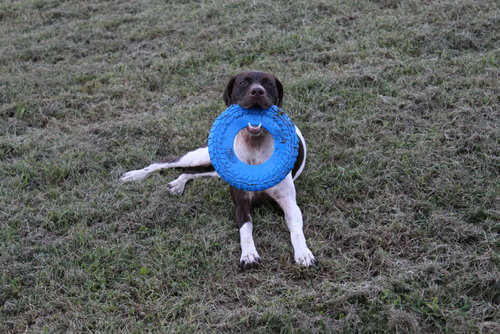
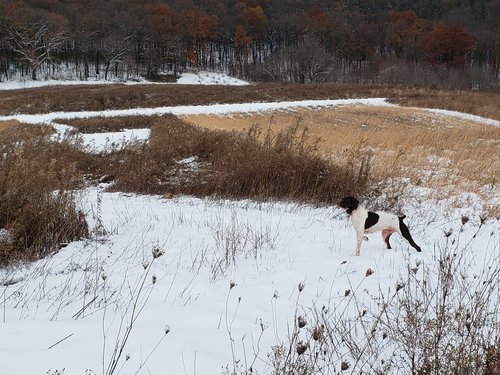
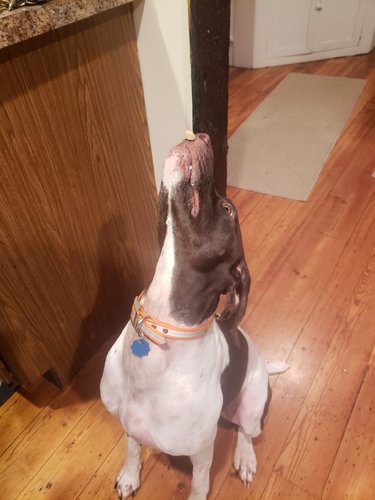
How well do your setters retrieve?